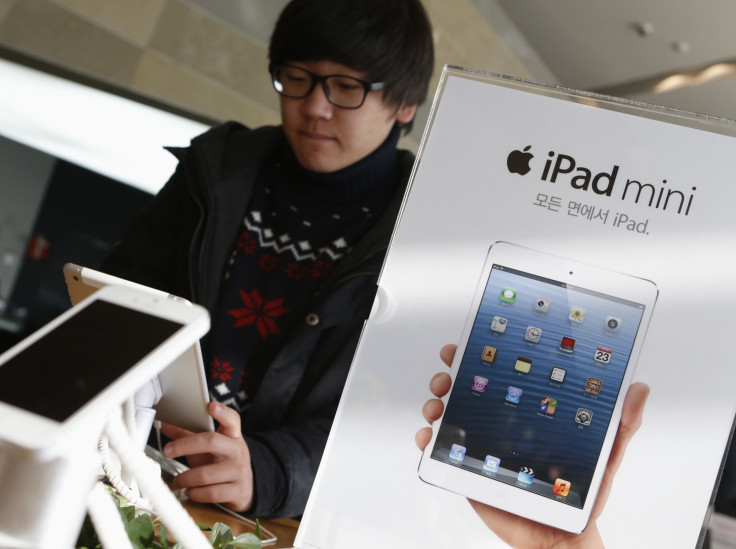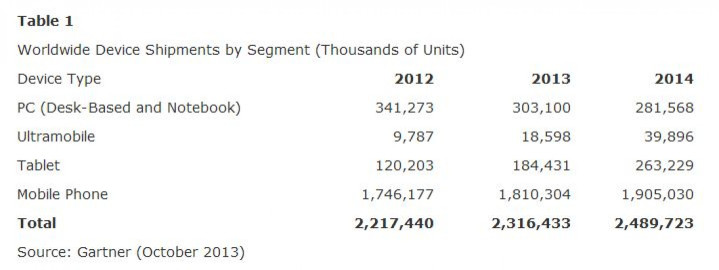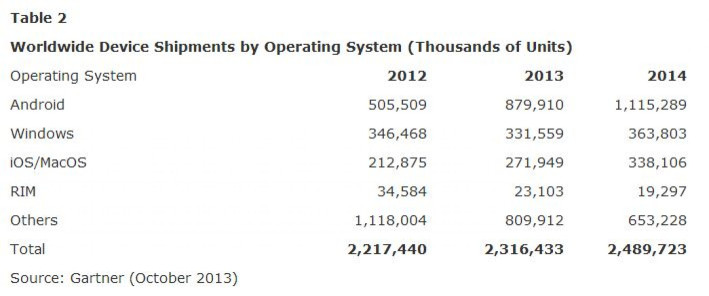Tablets Projected To Drive Up Worldwide Smart Device Shipments In 2013 Despite Sharp Decline In PC Demand

The growing popularity of tablets among consumers is expected to significantly drive up worldwide shipments of smart devices in 2013, overshadowing a decline in the desktop and laptop computers segment, according to a new report released by Gartner.
The combined shipments of smart devices worldwide, including PCs, tablets and mobile phones, are expected to reach 2.32 billion units in 2013, accounting for a 4.5 percent increase from 2012, Gartner said, adding that the market is being driven by a shift to lower-priced devices in nearly all device categories.
“Continuing on the trend we saw last year, we expect this holiday season to be all about smaller tablets as even the long-term holiday favorite -- the smartphone -- loses its appeal,” Carolina Milanesi, research vice president at Gartner, said in a statement.
According to Gartner, while worldwide shipments of desktop and notebook computers are forecast to total 303 million units in 2013, resulting in an 11.2 percent decline from 2012, shipments of tablets are likely to grow 53.4 percent this year to hit 184 million units. Mobile phone shipments are also projected to grow by 3.7 percent, accounting for a volume of more than 1.8 billion units.
The research firm said that premium tablets are threatened by a continuous price decline in the 7-inch form factor as a growing number of consumers are leaning toward smaller form factors. And, as for the mobile phone market, Gartner expects growth to come from mid-tier smartphones in mature markets and low-end Android smartphones in emerging markets.

According to the report, Microsoft's (NASDAQ:MSFT) acquisition of Nokia did not have a major impact on the forecast because Nokia was already assumed to account for the vast majority of the Windows Phone's market share for the projection. In September, Microsoft announced that it would acquire a substantial part of Nokia’s devices and services business for $7.17 billion in cash, in an effort to regain a foothold in the highly competitive smartphone market.
"Windows Phone challenges in the smartphone market remain the same, with the need to bring on board more developers and enrich the ecosystem, as well as turning the Windows Phone brand into a cool smartphone brand,” Milanesi said. “While there are clear benefits to the acquisition, such as channel strength, carrier relationship and emerging-market knowledge, the brand and ecosystem do not directly benefit from it.”
Google’s (NASDAQ:GOOG) Android is expected to remain the leading device operating system, accounting for 38 percent of worldwide shipments in 2013, while the Windows OS is projected to decline 4.3 percent in 2013 as a result of the decline in traditional PC sales. However, the platform is likely to return to growth in 2014.

Gartner also talked about the future of wearable devices, saying that the segment would remain a mere companion to mobile phones for the foreseeable future, with less than one percent of consumers expected to actually replace their mobile phones with a combination of a wearable device and a tablet by 2017.
© Copyright IBTimes 2024. All rights reserved.






















